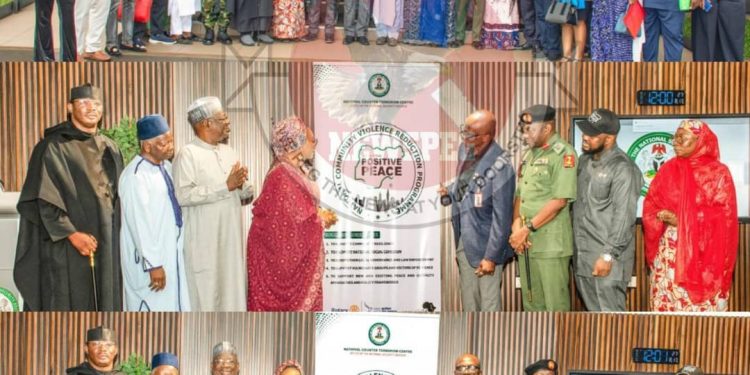By Nkechi Eze
In a decisive push to address the root causes of violence and strengthen Nigeria’s fragile peace architecture, the Federal Government has launched the Community Violence Reduction Programme (CVRP) 2025, an ambitious multi-stakeholder initiative that aims to curb insecurity through grassroots resilience, social cohesion, and targeted peace building interventions.
The programme, spearheaded by the National Counter Terrorism Centre (NCTC) in partnership with the Grey Child Foundation and other key collaborators, is designed to operate across the six geo-political zones. Its mandate is both urgent and far-reaching to confront terrorism, insurgency, banditry, and violent extremism not only through security operations but by dismantling the social and economic conditions that fuel these threats.
The launch ceremony, held at the NCTC headquarters in Abuja, drew a high-level audience of federal and state government officials, members of the diplomatic corps, security chiefs, civil society leaders, development partners, and private sector stakeholders. The convergence underscored a national consensus that security is not the sole burden of government forces but a collective responsibility requiring inclusive and sustained collaboration.
Speaking on behalf of the National Security Adviser, Mallam Nuhu Ribadu, mni, the National Coordinator of the NCTC Major General Adamu Laka, stressed that Nigeria’s complex security challenges demand innovative and people-centred approaches. He noted that while the military and security agencies have traditionally led the charge, the growing engagement of civil society, community organisations, and the private sector has expanded the reach and effectiveness of counter-violence strategies.
“The Grey Child Foundation Programme on Community Violence Reduction is designed to tackle these threats from their roots by strengthening communities, promoting resilience, and preventing the conditions that breed violence. Our resolve is firm, we will continue to deploy every resource, expertise, and partnership at our disposal to make Nigeria safer and more secure through diverse and targeted community-based activities,” he affirmed.
The partnership between NCTC and the Grey Child Foundation was formalised on June 18, 2025, with the signing of a Memorandum of Understanding. Under the agreement, the CVRP will focus on promoting accurate and positive narratives, fostering peacebuilding and social cohesion, and applying data-driven evaluation to ensure evidence-based decision-making in policy and implementation.
The Director-General of the Nigeria Governors’ Forum (NGF), Dr. Abdulateef Shittu, speaking on behalf of Nigeria’s 36 state governors, pledged the Forum’s continued commitment to complementing federal efforts in tackling insecurity. He warned that localised crimes often spiral into national threats, eroding stability and development. Dr. Shittu outlined the NGF’s proactive initiatives, including logistical support to security agencies, promotion of community-based policing, and the creation of a dedicated security department within the NGF Secretariat. He also revealed the establishment of a “Community of Practice on Security” a collaborative platform enabling states to share experiences, develop practical solutions, and embrace non-kinetic security approaches.
“The launch of the Community Violence Reduction Programme will serve as a catalyst for reducing violence and conflict in our communities while fostering lasting peace across the nation,” he said.
In her goodwill message, the Honourable Minister of Women Affairs and Social Development, Hon. Imaan Sulaiman-Ibrahim, FSI, commended the NCTC for adopting an inclusive approach. She stressed the importance of integrating gender perspectives into peace and security interventions, noting that families are the first line of defence against violence and extremism. The Minister pledged that under President Bola Ahmed Tinubu’s Renewed Hope Agenda, her Ministry would continue to champion the rehabilitation and reintegration of terrorism survivors through psychosocial support, livelihood empowerment, and community reintegration.
She further pointed to Nigeria’s Third National Action Plan on United Nations Security Council Resolution 1325 as a blueprint for ensuring women’s full participation in peace and security processes.
“Together, we can break the cycle of violence, heal affected communities, and secure a safer future for generations to come,” she said.
The event closed with a united call for stronger partnerships between government agencies, civil society organisations, security institutions, the private sector, and development partners to deliver lasting solutions to Nigeria’s security challenges.
With the CVRP 2025, Nigeria is signaling a shift towards a more inclusive, preventive, and sustainable approach to peace building, one that recognizes that defeating violence requires not only military action but also the patient work of rebuilding trust, restoring livelihoods, and empowering communities to stand as the first line of defence against insecurity.
















